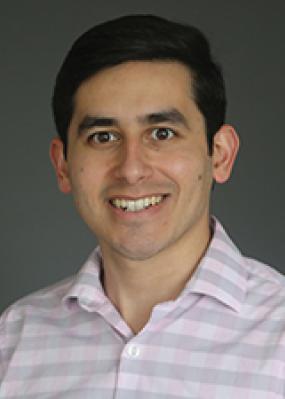Postdoc develops software and games to explain relationships between society and water resources

Malena Orduña Alegría | Postdoctoral Researcher | Kansas Geological Survey
Water may be ubiquitous, but it’s also a source of mystery.
“I remember my third-grade teacher in my first biology class said, ‘Water is life.’ And I was just like, ‘What do you mean?’ And then I just keep asking, and I figured out that there are so many things we know about water — but there are so many things that we don't know,” said Malena Orduña Alegría, a postdoctoral researcher at the Kansas Geological Survey.
Orduña Alegría, who uses she/they pronouns, earned their undergraduate degree from Universidad Autónoma de San Luis Potosí in Mexico. From there they went on to obtain a master’s degree in water resource management and engineering from Universität Stuttgart and a doctorate in socio-hydrology from Technische Universität Dresden, both in Germany.
“Since my undergrad, I started doing research projects related to water — either drinking water, water quantity, water quality, you know, like droughts and floods,” Orduña Alegría said. “In Mexico, I actually experienced them in real life.”
Part of Orduña Alegría’s master’s research took them to New Zealand, where they studied agricultural hydrology. There, nitrogen runoff from a local sheep farm would travel to a nearby vineyard whenever it rained, potentially contaminating the produce. Orduña Alegría was tasked with pinpointing the specific locations of the contamination and making recommendations about treating the water. Through this experience, they learned the importance of social and economic factors in water management.
“But actually making that decision has many different factors: whether that's a farm, whether it’s an area where they can actually put a water treatment plant, how much water is going to be treated. The economic factor is very important, but it's also the social factors, right? Because this might be a protected area, for example,” Orduña Alegría said. “So I realized that, at the end of the day, this decision is not just made by hydrologists. It’s actually made by many people with many different interests.”
Orduña Alegría’s current work involves analyzing groundwater conservation policies throughout the United States, but mostly in western Kansas. As a postdoctoral researcher at KGS, they’re developing software that combines different models to explore which water conservation policies work best with different social and economic factors. This software has the potential to help a variety of interested parties — such as governments, landowners and others — conserve water.
“Because the High Plains Aquifer has been used for irrigation for a long time now, the levels are very critical,” Orduña Alegría said. “Of course, it's super heterogeneous. Some farms have more water, whereas other farms are running dry but it’s everyone’s problem.”
Orduña Alegría’s postdoctoral position is funded by a National Science Foundation grant and is part of a collaboration between KGS, Virginia Tech University, Purdue University, Colorado State University and Colorado School of Mines. Although Orduña Alegría is moving to a faculty position at Oregon State University in the spring semester, they may have additional opportunities to educate the public about the connection between water and society. Orduña Alegría is a game developer in their spare time, and they’ve created several board games that demonstrate the hydrological cycle’s intersections with human behavior. Time permitting, they may collaborate in the future with local museums on additional games.
“I try to make games about the topics I'm studying to kind of test myself on how well I understand it,” Orduña Alegría said. “If you take a very complicated subject and simplify it and make it fun, it's a good way to test your knowledge and skills while simultaneously engage with other people, either students or farmers or any other community member. It's a very effective way to teach."
